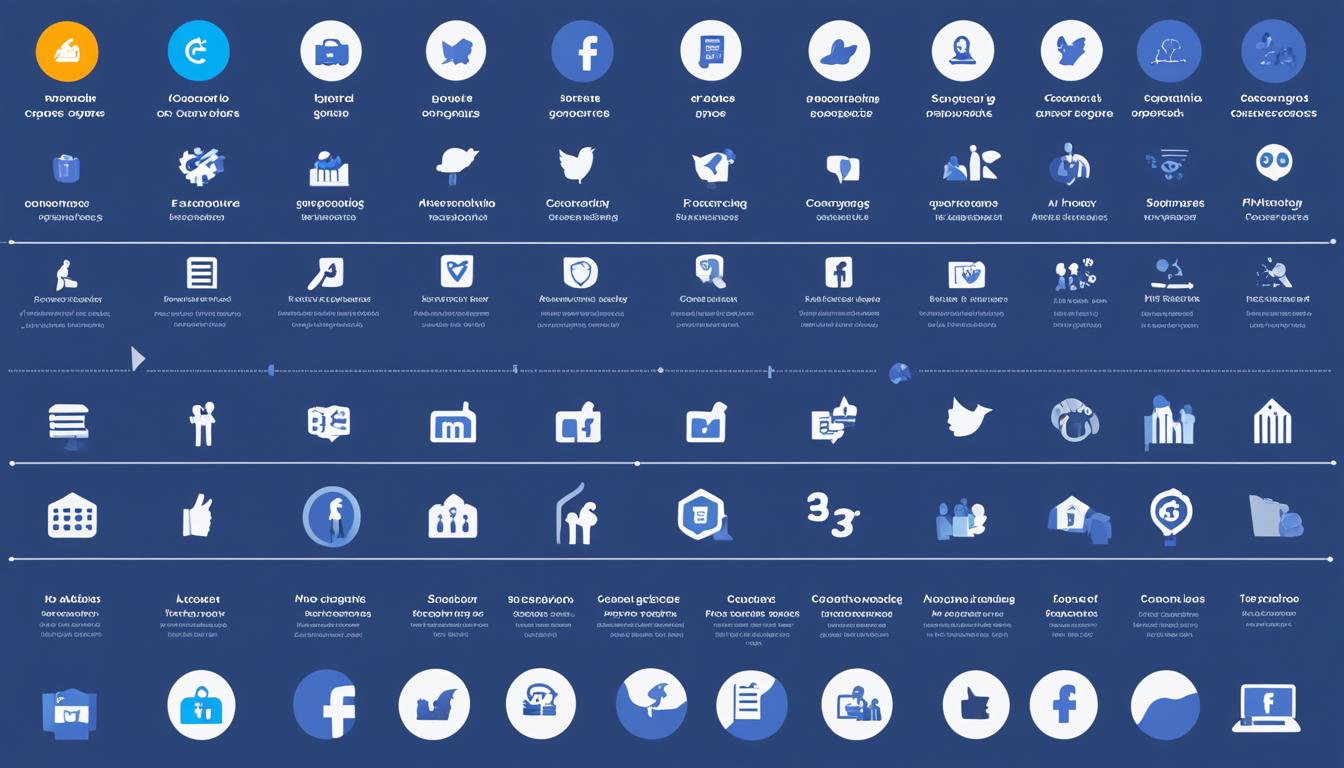When diving into the digital sphere of Facebook, an array of group options can be discovered, each serving a unique purpose within the thrilling cosmos of this social media giant. From the cozy corners of private Facebook groups to the open stages of public Facebook groups, and the halfway house of closed Facebook groups, the landscape is diverse. Facebook propels this diversity further by offering categorized experiences, catering to an assortment of needs and interests that define collective interactions on the platform.
The choices at hand are manifold, encompassing everything from strictly business-oriented Facebook group categories to playful environments designed for every genre of gaming and socialization under the sun. Whether you’re seeking to engage in commerce through a Buy & Sell group, aspiring to share knowledge or skills in a Social Learning group, or searching for professional opportunities in a Jobs group, there’s a place for you. Each group type is armed with specialized tools and settings offering a tailor-made fit, which ultimately shapes the communal rhythm and growth.
The types of groups on Facebook are more than mere labels; they are a beacon to like-minded individuals, a signal that here lies an opportunity for connection, learning, and sharing within the niches they care about most. It is this clear-cut delineation that charts the path for new alliances, fortifies existing ones, and curates an enriching and pleasant online experience for all involved.
Key Takeaways
- Facebook offers various group types to cater to different interests and objectives, enhancing user engagement.
- Group types such as General, Buy & Sell, and Social Learning are equipped with specialized features that define their purpose.
- Privacy settings in groups range from open, closed, to private, influencing the visibility and accessibility of group content.
- Choosing the correct group type is crucial for attracting the right audience and fostering community growth.
- The ability to change a group’s type allows for flexibility and adaptation as the community’s needs evolve.
Introduction to Facebook Groups and Their Importance
The advent of Facebook groups has significantly altered the landscape of online social interaction and community building. These digital hubs serve as a gateway for like-minded individuals to form a cohesive bond over shared passions, interests, and objectives. Whether for connecting local communities, fulfilling commercial aspirations, or providing educational platforms, the utility of Facebook groups as a social media feature cannot be overstated.
Engagement in these groups goes beyond mere discussion; it is predicated on a value exchange transaction philosophy. Each member presents something of value, whether it is tangible goods in a marketplace setting or intangible support in a peer network. This reciprocal exchange is foundational to what makes Facebook groups thrive as micro-communities within the greater web of social media.
Within the scope of these groups, sharing content stands at the core of community interaction. Members are encouraged to post updates, share multimedia, and contribute to the group’s purpose, which solidifies the group’s collective identity and fosters stronger member-to-member connections.
Facebook groups act as a canvas where the group members paint their collective narrative—one post, comment, and share at a time.
While starting as a General category by default, groups may evolve to adopt a specific archetype to enhance their community’s shared experience. The choice of group type echoes through the manner in which members socialize and conveys the essence of the group’s ethos and mission. Below is a table outlining the influence of group type upon member interaction:
| Group Type | Core Focus | Unique Member Interaction |
|---|---|---|
| General | Broad Engagement | Varied discussions reflecting diverse interests |
| Social Learning | Education and Knowledge Sharing | Structured learning through units and quizzes |
| Buy & Sell | Commerce | Facilitating transactions and product discussions |
| Parenting | Family Support | Sharing advice and experiences in raising children |
| Gaming | Entertainment | Organizing game events and sharing game tactics |
By joining a Facebook group, users are not just adding another social media feature to their digital routines—they’re tapping into a dynamic ecosystem where every share, every post, and every interaction adds a brick to the edifice of a digital community.
The Role of Group Types in Facebook Community Building
The tapestry of Facebook communities is rich and diverse, providing a home for a variety of different types of groups on the social platform. At the heart of building online communities is the alignment between the group’s purpose and its functionalities. When moderators choose the right category, like Social Learning or Buy and Sell, they pave the way for engaging with content that resonates with the audiences and drives group activity.
Consider social learning groups, which are cavities of knowledge sharing where educational content is the foundation. Through quizzes, lessons, and collaborative projects, these groups encourage active learning and connect members who are keen on personal development and skill enhancement in an organized, digitally-facilitated environment.
- General: A broad platform for various discussions and content sharing
- Buy and Sell: Commerce-driven, for buying and selling items within community standards
- Social Learning: Education-focused, allowing for structured lessons and participant progress tracking
- Gaming: Entertainment-centric, uniting gamers and facilitating game-related discussions and events
Gaming groups, on the other hand, unite people around a passion for play, be it board games, video games, or fantasy leagues. These groups may organize online tournaments and foster a competitive yet communal feel that engages members deeply with the subject matter at hand.
| Group Type | Main Purpose | Key Features |
|---|---|---|
| General | Versatile Interaction | Default Tools, Flexible Topics |
| Buy & Sell | Marketplace Activity | Listing Items, Price Settings |
| Social Learning | Educational Engagement | Units, Quizzes, Progress Tracking |
| Gaming | Game Discussion/Planning | Organized Tournaments, Game-specific Threads |
With this purposeful organization, Facebook groups cultivate a variety of dedicated spaces where members can comfortably know what to expect, and thus engage with content more meaningfully. This, in turn, reinforces the feeling of unity within these online communities, creating a digital ecosystem that thrives on shared interests and mutual growth.
How Types of Groups on Facebook Shape User Experience
Facebook groups have evolved into dynamic digital spaces that reflect the various interests and needs of their users. From small discussion forums to large-scale communities, the user experience is significantly influenced by the Facebook group type chosen during the creation of each group. Having a solid understanding of the unique features that each category offers can empower admins to shape their group in ways that boost member engagement and enrich the overall community interaction.
General Group Features
Starting with the baseline, General Facebook groups stand as the cornerstone for group interaction, with standard features as their foundation. They act as a springboard from which administrators can leverage admin tools like membership requests, content moderation, and engagement analytics to manage their community effectively. The versatility of General Groups means that they can be customized over time, allowing admins to adapt to the growing needs of their members.
Custom Features in Specific Facebook Group Types
Beyond the General Groups, Facebook presents an array of categories of groups, each equipped with its own specialized tools designed to accentuate the group’s purpose. These can range from advanced selling features in Buy and Sell groups to collaborative learning systems in Social Learning groups. Integrating these specialized features not only enhances user experience but also streamlines community management, aligning it with the group’s objectives.
Impact of Group Type on Member Interaction
The chosen Facebook group type can dramatically affect how members use the group and engage with one another. Structured formats in certain group types, like Jobs or Social Learning, dictate a more formal style of interaction, while groups like Buy and Sell favor a transactional approach. Understanding the distinct dynamics each type offers enables admins to foster environments that resonate with their membership base, cultivating a relevant and active community.

| Group Type | Key Feature | Member Engagement |
|---|---|---|
| General | Flexible admin tools and discussion topics | Open-ended, versatile member interaction |
| Buy and Sell | Sales listings with dedicated marketplace | Transaction-focused with buy/sell posts |
| Parenting | Anonymous posting and mentorship programs | Supportive and advice-oriented exchanges |
| Jobs | Job listings and professional networking | Employment-directed discovery and contact |
| Social Learning | Educational tools with progress tracking | Collaborative learning and information sharing |
In conclusion, by harnessing the various Facebook group features that coincide with their type, group admins can curate a digital space that not only reflects their vision but also maximizes the enjoyment and value for each member.
Detailed Overview of Facebook Group Categories
With popular Facebook groups being such an integral part of online social dynamics, a well-rounded overview of Facebook group types is essential for understanding how these digital spaces function and cater to diverse user needs. Below we delve into the varied categories of Facebook groups.

General groups serve as the foundational building blocks, offering broad access to features suitable for a wide array of activities and interaction. They are the springboard from which many niche groups branch out, welcoming members from all walks of life.
Social learning groups have revolutionized how education and knowledge sharing occur online. They are designed specifically for educational content, allowing for the creation of structured units, assignments, and progress tracking, thus fostering a collaborative learning experience.
For families and caregivers, parenting groups offer a judgment-free zone with functions customized for sensitive discussions and exchanges. Here, members can seek advice, share experiences, and find support in the unique challenges of raising children.
Given this variety, members and group creators alike can find a niche that resonates with their interests or objectives, making Facebook groups a versatile tool in connecting and empowering communities.
Choosing the Right Category for Your Facebook Group
When it comes to creating an impactful online presence and fostering a thriving community via social media, selecting the right Facebook group is a cornerstone for success. Tailoring a group to its purpose is more than a mechanical decision—it’s a strategic move that sets the stage for creating community engagement and building a cohesive user experience. As an administrator, understanding your group’s raison d’être aids in sculpting the environment that you envision for your members, ensuring the functionality and dialogue within the community remains on point.
Purpose-Driven Group Selection
To ensure that your Facebook group stands as a purposeful assembly point for its members, aligning the group’s core focus with the appropriate category is fundamental. Will your group serve as a bustling marketplace, or as an incubator for educational growth? Pinpointing the group’s niche is your first move towards cultivating an environment ripe for interaction and growth. A clear purpose aids in tailoring the group to purpose, enabling you to handpick the features that will be most conducive to the group’s objectives.
Target Audience Considerations
The demographic landscape of your intended community should guide the compass when selecting the target audience for your Facebook group. Each group type entices a different segment of the Facebook populace. Knowledge of member demographics and their online behavior patterns is invaluable, allowing you to tailor your group to resonate with their conversations and ambitions. This cognizance is of utmost importance, as it steers the direction of content that spurs audience engagement and participation.
Changing Your Facebook Group Type
Change is part of life, and Facebook groups are no exception. With a dynamic and shifting online landscape, the need to stay relevant may prompt a change in direction. Modifying the group category is made facile with Facebook group settings. Whether you’re seeking to transform your group to better reflect its evolving goals or simply looking to refresh your strategy, knowing how to change the type of Facebook group is a testament to the malleable nature of these digital communities. Careful consideration and a planned approach to such amendments can rejuvenate member interaction and preserve the vitality of the community.
FAQ
What are the different types of groups on Facebook?
The different types of groups on Facebook include General, Social Learning, Gaming, Jobs, Buy & Sell, Parenting, and Work. Each category offers unique features tailored to their focus.
How do Facebook groups serve their members and community?
Facebook groups allow members with shared interests to engage in discussions, content sharing, and value exchange transactions. They foster community building, collaboration, and provide a platform for like-minded individuals to connect.
How do group types impact Facebook community building?
Group types help define the focus and modes of interaction within a community, leading to stronger member engagement and a clear sense of purpose. Different types of groups offer various features that are aligned with specific community objectives.
What are some standard features available in General Facebook groups?
General Facebook groups come equipped with admin tools for membership management, post scheduling, moderation alerts, discussion topics, job listings, mentorship opportunities, and social learning units.
Can you describe some custom features available in specific Facebook group types?
Buy & Sell groups can host sale listings with specified currencies, Jobs groups offer structured job listings and applications, and Parenting groups support features like anonymous posting and mentorship.
How does a Facebook group’s type influence member interaction and engagement?
The type of a Facebook group shapes how users interact within the community. For example, Jobs groups focus on employment opportunities, while Social Learning groups emphasize educational content and progress tracking, which tailor the members’ interaction accordingly.
What are some popular Facebook group categories?
Some popular Facebook group categories include Social Learning for educational content, Gaming for connecting game enthusiasts, Buy & Sell for commercial transactions, and Parenting for advice and support among parents.
What should I consider when selecting the right category for my Facebook group?
When choosing a category, consider the primary purpose of your group, the interests of your target audience, and how the specific category will foster the community engagement you aim to achieve.
How do I select the right target audience for my Facebook group?
Identify the demographic characteristics, interests, and needs of the individuals you want to attract to your group. Align your group’s type and content with these factors to ensure you’re providing value to your members and fostering meaningful interactions.
Is it possible to change the type of my Facebook group after it’s been created?
Yes, you can change your Facebook group’s type at any time through the group’s settings page. However, consider the implications of this change, as it may alter the available features and the way members interact within the group.
Hi there, I'm Jacqueline! Passionate about the ins and outs of Facebook, I created this blog to be your go-to resource for mastering ad campaigns, community engagement, and algorithm hacks. Looking to make your Facebook efforts truly 'Like'-worthy? You're in the right place. Let's elevate your social impact together!




